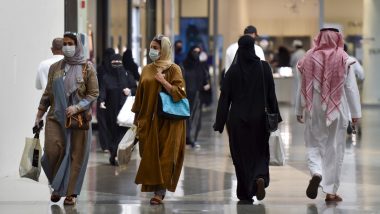Jerusalem, May 24: Muslims around the world on Sunday began celebrating Eid al-Fitr, a normally festive holiday marking the end of the fasting month of Ramadan, with millions under strict stay-at-home orders and many fearing renewed coronavirus outbreaks.
The three-day holiday is usually a time of travel, family get-togethers and lavish daytime feasts after weeks of dawn-to-dusk fasting. But this year many of the world's 1.8 billion Muslims will have to pray at home and make due with video calls. Also Read | Tamil Nadu State Disaster Management Authority Issues SOPs For Passengers of Domestic Flights: Live Breaking News Headlines & Coronavirus Updates, May 24, 2020.
Some countries, including Turkey, Iraq and Jordan, have imposed round-the-clock holiday curfews. But even where many restrictions have been lifted, celebrations will be subdued because of fears of the pandemic and its economic fallout.
Saudi Arabia, home to the holy cities of Mecca and Medina, is under a complete lockdown, with residents only permitted to leave their homes to purchase food and medicine. Also Read | Chechen President Ramzan Kadyrov Calls for Divine Help in Overcoming Coronavirus Pandemic.
In Jerusalem, Israeli police said they broke up an “illegal demonstration” and arrested two people outside the Al-Aqsa mosque, which Muslim authorities have closed for prayers since mid-March and will not reopen until after the holiday.
Worshippers who tried to enter the compound scuffled with the police.
Al-Aqsa is the third holiest site in Islam and would ordinarily welcome tens of thousands of worshippers during the Eid. The hilltop compound is also the holiest site for Jews, who know it as the Temple Mount. The site has long been a flashpoint in the Israeli-Palestinian conflict.
Iran, which is battling the deadliest outbreak in the Middle East, allowed communal prayers at some mosques but cancelled the annual mass Eid prayers in
Tehran led by Supreme Leader Ayatollah Ali Khamenei. Iran has reported over 130,000 cases and more than 7,000 deaths. The virus causes mild to moderate flu-like symptoms in most patients, who recover within two to three weeks. But it is highly contagious and can cause severe illness or death, particularly in older patients or those with underlying health conditions.
Indonesia, the world's largest Muslim-majority nation, has reported nearly 22,000 infections and 1,350 fatalities, the most in Southeast Asia. Lockdown orders intended to contain the pandemic mean there will be no congregational prayers at mosques or even open fields, no family reunions, no relatives bearing gifts for children.
“This outbreak is not just dampening spirits of Eid, but also has made the tradition entirely different,” said Andieka Rabbani, a university student in Jakarta. This year, like many Indonesians, he will only see family and friends through video calls.
In neighboring Muslim-majority Malaysia, businesses have mostly reopened after weeks of lockdown. But mass gatherings are still banned and people are not allowed to travel back to their hometowns for the holiday. Police have turned away more than 5,000 cars and have warned of strict penalties for those who try to sneak home.
Malaysians are only allowed to visit relatives who live nearby, and only on Sunday, with gatherings limited to 20 people. Mosques have reopened but are limited to small congregations of up to 30. Malaysia has reported 7,185 infections and 115 deaths.
Rohaizam Zainuddin said he felt blessed he could celebrate Eid with his elderly parents living nearby, but his sister in another state could not return home. “We are frustrated that celebration this year is not the same," he said.
(The above story is verified and authored by Press Trust of India (PTI) staff. PTI, India’s premier news agency, employs more than 400 journalists and 500 stringers to cover almost every district and small town in India.. The views appearing in the above post do not reflect the opinions of LatestLY)













 Quickly
Quickly


